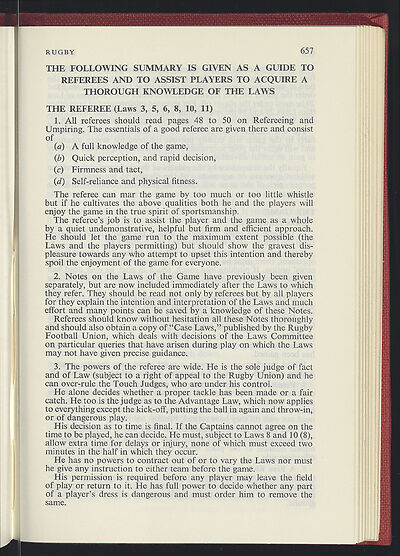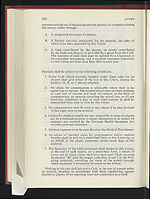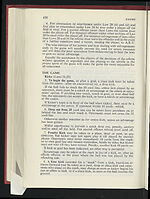1964-65
(691)
Download files
Complete book:
Individual page:
Thumbnail gallery: Grid view | List view

657
i�
RUGBY
THE FOLLOWING SUMMARY IS GIVEN AS A GUIDE TO
REFEREES AND TO ASSIST PLAYERS TO ACQUIRE A
THOROUGH KNOWLEDGE OF THE LAWS
THE REFEREE
(
Laws 3, 5, 6, 8
,
10, 11)
1. All referees should read pages 48 to 50 on Refereeing and
Umpiring. The essentials of a good referee are given there and consist
of
(a) A full knowledge of the game,
(b) Quick perception, and rapid decision,
(c) Firmness and tact,
(d) Self-reliance and physical fitness.
The referee can mar the game by too much or too little whistle
but if he cultivates the above qualities both he and the players will
enjoy the game in the true spirit of sportsmanship.
The referee's job is to assist the player and the game as a whole
by a quiet undemonstrative, helpful but firm and efficient approach.
He should let the game run to the maximum extent possible (the
Laws and the players permitting) but should show the gravest dis-
pleasure towards any who attempt to upset this intention and thereby
spoil the enjoyment of the game for everyone.
2. Notes on the Laws of the Game have previously been given
separately, but are now included immediately after the Laws to which
they refer. They should be read not only by referees but by all players
for they explain the intention and interpretation of the Laws and much
effort and many points can be saved by a knowledge of these Notes.
Referees should know without hesitation all these Notes thoroughly
and should also obtain a copy of "Case Laws," published by the Rugby
Football Union, which deals with decisions of the Laws Committee
on particular queries that have arisen during play on which the Laws
may not have given precise guidance.
3. The powers of the referee are wide. He is the sole judge of fact
and of Law (subject to a right of appeal to the Rugby Union) and he
can over-rule the Touch Judges, who are under his control.
He alone decides whether a proper tackle has been made or a fair
catch. He too is the judge as to the Advantage Law, which now applies
to everything except the kick-off, putting the ball in again and throw-in,
or of dangerous play.
His decision as to time is final. If the Captains cannot agree on the
time to be played, he can decide. He must, subject to Laws 8 and 10 (8),
allow extra time for delays or injury, none of which must exceed two
minutes in the half in which they occur.
He has no powers to contract out of or to vary the Laws nor must
he give any instruction to either team before the game.
His permission is required before any player may leave the field
of play or return to it. He has full power to decide whether any part
of a player's dress is dangerous and must order him to remove the
same.
1�
i�
RUGBY
THE FOLLOWING SUMMARY IS GIVEN AS A GUIDE TO
REFEREES AND TO ASSIST PLAYERS TO ACQUIRE A
THOROUGH KNOWLEDGE OF THE LAWS
THE REFEREE
(
Laws 3, 5, 6, 8
,
10, 11)
1. All referees should read pages 48 to 50 on Refereeing and
Umpiring. The essentials of a good referee are given there and consist
of
(a) A full knowledge of the game,
(b) Quick perception, and rapid decision,
(c) Firmness and tact,
(d) Self-reliance and physical fitness.
The referee can mar the game by too much or too little whistle
but if he cultivates the above qualities both he and the players will
enjoy the game in the true spirit of sportsmanship.
The referee's job is to assist the player and the game as a whole
by a quiet undemonstrative, helpful but firm and efficient approach.
He should let the game run to the maximum extent possible (the
Laws and the players permitting) but should show the gravest dis-
pleasure towards any who attempt to upset this intention and thereby
spoil the enjoyment of the game for everyone.
2. Notes on the Laws of the Game have previously been given
separately, but are now included immediately after the Laws to which
they refer. They should be read not only by referees but by all players
for they explain the intention and interpretation of the Laws and much
effort and many points can be saved by a knowledge of these Notes.
Referees should know without hesitation all these Notes thoroughly
and should also obtain a copy of "Case Laws," published by the Rugby
Football Union, which deals with decisions of the Laws Committee
on particular queries that have arisen during play on which the Laws
may not have given precise guidance.
3. The powers of the referee are wide. He is the sole judge of fact
and of Law (subject to a right of appeal to the Rugby Union) and he
can over-rule the Touch Judges, who are under his control.
He alone decides whether a proper tackle has been made or a fair
catch. He too is the judge as to the Advantage Law, which now applies
to everything except the kick-off, putting the ball in again and throw-in,
or of dangerous play.
His decision as to time is final. If the Captains cannot agree on the
time to be played, he can decide. He must, subject to Laws 8 and 10 (8),
allow extra time for delays or injury, none of which must exceed two
minutes in the half in which they occur.
He has no powers to contract out of or to vary the Laws nor must
he give any instruction to either team before the game.
His permission is required before any player may leave the field
of play or return to it. He has full power to decide whether any part
of a player's dress is dangerous and must order him to remove the
same.
1�
Set display mode to:
![]() Universal Viewer |
Universal Viewer | ![]() Mirador |
Large image | Transcription
Mirador |
Large image | Transcription
| Games and sports in the army > 1964-65 > (691) |
|---|
| Permanent URL | https://digital.nls.uk/249219234 |
|---|
| Description | 'Games and Sports in the Army' was an annual publication produced by the British War Office between the 1930s and 1960s. This included the Second World War. It outlines the rules and regulations for games and sports played by members of the armed forces. It features names and photographs of team members, and examples of contemporary advertising. |
|---|---|
| Shelfmark | GWB.52 |

